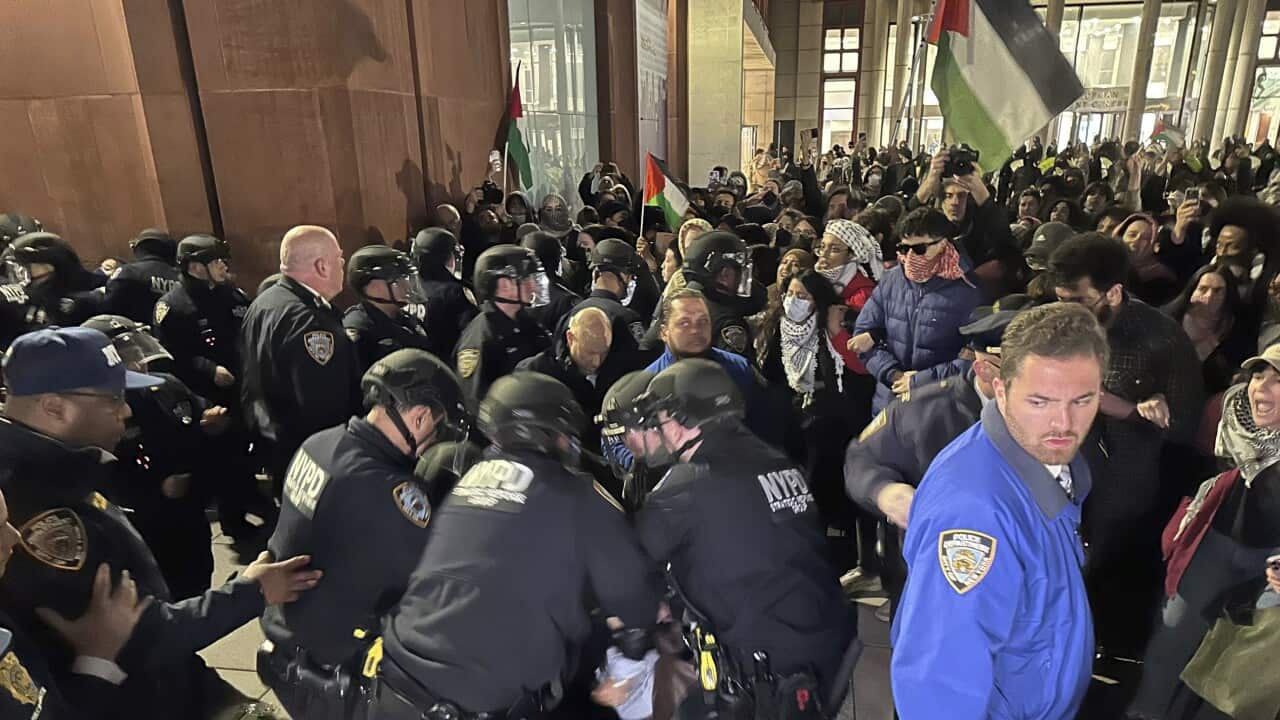Violence has broken out between police, pro-Israel protesters and pro-Palestinian protesters on campuses across the United States, coinciding with politicians in the lower house passing a bill on Wednesday to establish a broader definition of antisemitism.
The bill, named the Antisemitism Awareness Act, passed the lower house by a large bipartisan majority of 230 to 91.
It now passes to the Senate, and if approved, can be enshrined into law.
Opponents of the new legislation, like Democratic representative Jerry Nadler, say the new definition of antisemitism could impact freedom of speech in the country and affect the outcome of legal proceedings.
Those who support the move see it as extra protection for Jewish communities.
Dozens of US universities and schools are currently facing civil rights investigations by the US Department of Education over allegations of antisemitism and Islamophobia.
The Act would require the Department of Education to use the International Holocaust Remembrance Alliance's (IHRA) working definition of antisemitism, which includes "targeting of the state of Israel, conceived as a Jewish collectivity".
LISTEN TO

Violent clashes between pro-Palestinian student protesters and counter-demonstrators in the United States...
SBS News
01:38
Rise in antisemitism and Islamophobia
Dvir Abramovich, chair of the Jewish-Australian organisation Anti-Defamation Commission, said antisemitism right now is nothing short of a national emergency.
"It's clear there is a crisis of antisemitism, not just on university campuses but everywhere," he told SBS News.
"Since October 7 there has been a massive spike, an epidemic of hatred."
There has also been a significant rise in Islamophobia — prejudice or discrimination against Muslims — since the most recent escalation of the Hamas-Israel conflict in October.
In late November last year, the Islamophobia Register Australia said over a seven-week period from 7 October, compared to pre-7 October levels in 2023.
In March this year, the United Nations warned acts of harassment, intimidation, violence and incitement based on religion or belief had risen to "alarming levels" across the world.
What is antisemitism?
In its most basic form, antisemitism is defined as prejudice or discrimination against Jewish people, and the origins of the term stretch back to the 1800s.
The rise of Adolf Hitler, the Nazi Party and the Holocaust marked a rise in antisemitism in social consciousness. In more recent years, the term has expanded.
In 2016, IHRA adopted a broader definition of antisemitism, which has been endorsed by US President Joe Biden's administration.
Antisemitism is a certain perception of Jews, which may be expressed as hatred toward Jews. Rhetorical and physical manifestations of antisemitism are directed toward Jewish or non-Jewish individuals and/or their property, toward Jewish community institutions and religious facilities.IHRA
The move to enshrine the expanded definition into law has divided opinion.
In fact, the man who wrote the original definition used by IHRA has publicly said he is concerned it could be weaponised to muzzle free speech.
US attorney Kenneth Stern wrote in The Boston Globe earlier this year that when he first drafted his version of the definition in 2005, it was intended simply as a means to measure levels of antisemitism, but not to label anyone as antisemitic.
Protecting Jewish people
Abramovich supports the expanded definition to mandate the Department of Education, saying it would further protect the rights of Jewish students.
"A broader definition of antisemitism could make it easier for authorities to intervene and stop potentially harmful protests, graffiti and other rhetoric," he said.
"University students shouldn't feel threatened physically or emotionally simply for wearing a yarmulke or a Star of David."

Abramovich said there has been a "crisis of antisemitism" since 7 October. Source: AAP / Dale Williams
"We should support adopting the legislation as accurate and effective in identifying and acting on antisemitism," he said.
"We need [Prime Minister] Anthony Albanese to chair a taskforce and look into actively supporting Jewish Australians, rhetoric and slogans are not enough."
Stifling free expression
Other groups inside and outside the Jewish community have expressed their belief that the proposed legislation goes too far.
Executive officer of the Jewish Council of Australia Max Kaiser told SBS News the bill raises a lot of concern.
"Claims of antisemitism are being used to crack down on legitimate political expression and peaceful protests on campuses," he said.
"Students are very concerned about what's happening in Gaza and they want their universities to divest away from Israel."

Members of the Jewish community gather opposite a pro-Palestinian encampment at the University of Melbourne. Source: AAP / Joel Carrett
In an open letter to US politicians, the ACLU wrote: "Federal law already prohibits antisemitic discrimination and harassment by federally funded entities. H.R. 6090 is therefore not needed to protect against antisemitic discrimination; instead, it would likely chill free speech of students on college campuses by incorrectly equating criticism of the Israeli government with antisemitism."
Kaiser also said claims that campus protests are dangerous for Jewish students are "cynical".
"Many protests are welcoming to Jews and feature them as key speakers and organisers," he said.
"I think there's little threat to safety for Jewish students, but rather pro-Israel students taking offence."




